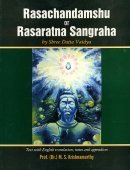Antravriddhi, Antravṛddhi, Antra-vriddhi, Āntravṛddhi, Amtravriddhi: 9 definitions
Introduction:
Antravriddhi means something in Hinduism, Sanskrit, Marathi. If you want to know the exact meaning, history, etymology or English translation of this term then check out the descriptions on this page. Add your comment or reference to a book if you want to contribute to this summary article.
The Sanskrit terms Antravṛddhi and Āntravṛddhi can be transliterated into English as Antravrddhi or Antravriddhi, using the IAST transliteration scheme (?).
In Hinduism
Ayurveda (science of life)
Kalpa (Formulas, Drug prescriptions and other Medicinal preparations)
Source: Shodhganga: Edition translation and critical study of yogasarasamgrahaĀntravṛddhi (आन्त्रवृद्धि) refers to “hernia” and is one of the various diseases mentioned in the 15th-century Yogasārasaṅgraha (Yogasara-saṅgraha) by Vāsudeva: an unpublished Keralite work representing an Ayurvedic compendium of medicinal recipes. The Yogasārasaṃgraha [mentioning āntravṛddhi] deals with entire recipes in the route of administration, and thus deals with the knowledge of pharmacy (bhaiṣajya-kalpanā) which is a branch of pharmacology (dravyaguṇa).

Āyurveda (आयुर्वेद, ayurveda) is a branch of Indian science dealing with medicine, herbalism, taxology, anatomy, surgery, alchemy and related topics. Traditional practice of Āyurveda in ancient India dates back to at least the first millenium BC. Literature is commonly written in Sanskrit using various poetic metres.
Languages of India and abroad
Marathi-English dictionary
Source: DDSA: The Molesworth Marathi and English Dictionaryantravṛddhi (अंत्रवृद्धि).—f S Inguinal hernia.
Marathi is an Indo-European language having over 70 million native speakers people in (predominantly) Maharashtra India. Marathi, like many other Indo-Aryan languages, evolved from early forms of Prakrit, which itself is a subset of Sanskrit, one of the most ancient languages of the world.
Sanskrit dictionary
Source: DDSA: The practical Sanskrit-English dictionaryAntravṛddhi (अन्त्रवृद्धि).—f. inguinal hernia, rupture, swelling of the scrotum.
Derivable forms: antravṛddhiḥ (अन्त्रवृद्धिः).
Antravṛddhi is a Sanskrit compound consisting of the terms antra and vṛddhi (वृद्धि).
Source: Cologne Digital Sanskrit Dictionaries: Shabda-Sagara Sanskrit-English DictionaryAntravṛddhi (अन्त्रवृद्धि).—f.
(-ddhiḥ) Inguinal hernia, rupture. E. antya, and vṛddhi increase.
Source: Cologne Digital Sanskrit Dictionaries: Monier-Williams Sanskrit-English DictionaryAntravṛddhi (अन्त्रवृद्धि):—[=antra-vṛddhi] [from antra] f. inguinal hernia, rupture.
Source: Cologne Digital Sanskrit Dictionaries: Goldstücker Sanskrit-English DictionaryAntravṛddhi (अन्त्रवृद्धि):—[tatpurusha compound] f.
(-ddhiḥ) (In Medicine.) The swelling of the scrotum by the descent of the intestines (hernia); one of the seven diseases of the scrotum (comp. besides vātavṛddhi, pittavṛddhi, śleṣmavṛddhi, śoṇitavṛddhi, medovṛddhi and mūtravṛddhi) and considered as generally incurable. E. antra (in the sense of an instrum.) and vṛddhi, scil. muṣkasya.
Source: Cologne Digital Sanskrit Dictionaries: Yates Sanskrit-English DictionaryAntravṛddhi (अन्त्रवृद्धि):—[antra-vṛddhi] (dviḥ) 2. f. Rupture.
[Sanskrit to German]
Sanskrit, also spelled संस्कृतम् (saṃskṛtam), is an ancient language of India commonly seen as the grandmother of the Indo-European language family (even English!). Closely allied with Prakrit and Pali, Sanskrit is more exhaustive in both grammar and terms and has the most extensive collection of literature in the world, greatly surpassing its sister-languages Greek and Latin.
Kannada-English dictionary
Source: Alar: Kannada-English corpusAṃtravṛddhi (ಅಂತ್ರವೃದ್ಧಿ):—[noun] abdominal hernia; rupture.
Kannada is a Dravidian language (as opposed to the Indo-European language family) mainly spoken in the southwestern region of India.
See also (Relevant definitions)
Partial matches: Vriddhi, Antra.
Full-text: Amtravriddhi, Antarvriddhi, Antra Vriddhi, Antravruddhi, Antra.
Relevant text
Search found 3 books and stories containing Antravriddhi, Antravṛddhi, Antra-vriddhi, Āntravṛddhi, Amtravriddhi, Antravrddhi, Antra-vṛddhi, Antra-vrddhi, Aṃtravṛddhi; (plurals include: Antravriddhis, Antravṛddhis, vriddhis, Āntravṛddhis, Amtravriddhis, Antravrddhis, vṛddhis, vrddhis, Aṃtravṛddhis). You can also click to the full overview containing English textual excerpts. Below are direct links for the most relevant articles:
Sushruta Samhita, volume 2: Nidanasthana (by Kaviraj Kunja Lal Bhishagratna)
Sushruta Samhita, volume 4: Cikitsasthana (by Kaviraj Kunja Lal Bhishagratna)
The Garuda Purana (by Manmatha Nath Dutt)
Chapter CLXXXII - The Nidanam of Shlipadam (Elephantiasis) < [Dhanvantari Samhita]
Related products


